-
Registration for CyberPatriot IV competition to end this week
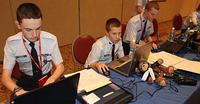
With less than a week left before registration closes, CyberPatriot IV, the National High School Cyber Defense Competition, has more than 850 teams registered; this competition is attracting high school educators across the United States; the structure of the competition provides students hands-on learning while competing virtually against their peers and introduces many to the idea of cyber security as a profession
-
-
The Certified Protection Officer (CPO) 8th Edition launched
The updated version of a training course for Certified Protection Officers is now available online; the course and exam provide candidates with the IFPO certification; the course offers training in security technology, laws, trends, and techniques
-
-
Proton-based transistor could let machines communicate with humans
Devices humans use, from light bulbs to iPods, send information using electrons; human bodies and all other living things, on the other hand, send signals and perform work using ions or protons; researchers build a novel transistor that uses protons, creating a key piece for devices that can communicate directly with living things
-
-
Laser device detects IEDs

Researchers have developed a laser that could detect roadside bombs — the deadliest enemy weapon U.S. and coalition soldiers encountered in Iraq and Afghanistan; the laser, which has comparable output to a simple presentation pointer, potentially has the sensitivity and selectivity to canvas large areas and detect improvised explosive devices
-
-
St. Andrews University promoting its certificate in terrorism studies

The University of St. Andrews is promoting a program leading to a certificate in it terrorism studies; the program was established in 2006 in is offered on-line
-
-
9/11 generates growth of homeland security college programs
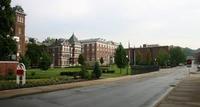
The 9/11 attacks led to a flurry of spending not only on defense and homeland security needs, but also education; in recent years dozens of homeland security programs have emerged at community colleges, universities, and graduate schools across the country and thousands of students have flocked to these new programs lured by the promise of jobs
-
-
Wake Tech uses grant funding to expand law enforcement education
North Carolina-based Wake Tech Community College received grants of more than $2.5 million in the 2010-2011 fiscal year; the money was used, among other things, to develop training programs in the latest cybercrime and latent evidence technologies and to add a new, state-of-the-art crime lab to its public safety training facility
-
-
New training facility features simulated bus, air, and rail stations
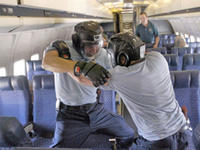
On Tuesday DHS Secretary Janet Napolitano was in Brunswick, Georgia for the grand opening of a sophisticated new $5.3 million counter-terrorism training center for law enforcement officials; the 22,000 square-foot facility features several simulation areas including a mock bus terminal, subway station, and an airport terminal
-
-
New coatings show promise as flame retardants

Ignition of soft furnishings account for about 5 percent of residential fires, and the consequences are disproportionately high; these fires are responsible for a third of fire-caused deaths of civilians and 11 percent of property losses due to fires in homes; NIST and Texas A&M researchers developed novel carbon nanofiber-filled coatings which outperformed conventional flame retardants by at least 160 percent and perhaps by as much as 1,130 percent
-
-
California universities prepare homeland security leaders of tomorrow
Fresno State University in California is readying itself for the launch of a new bachelor’s degree program that prepares students for careers in homeland security and emergency management; the program is part of a broader effort by California State University (CSU) leaders as well as local and state officials to boost the state’s security by training more professionals to enter a field that is facing shortages of qualified workers
-
-
Online university announces Master’s in homeland security program
An online university recently announced that students can now enroll in its online degree program to obtain a Master’s of Science in Homeland Security; the online degree can be earned through Capella University, an accredited online university with nearly 40,000 students currently enrolled; courses will focus on topics like emergency preparedness, management, infrastructure protection, threat analysis, media communications, and cyber security
-
-
Local Beaumont, CA officers attend special FBI training course
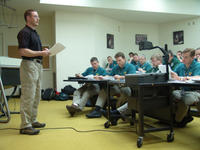
Officers from the local police department in Beaumont, California have been selected to attend a special law enforcement training course at the FBI Academy in Quantico, Virginia; located on a Marine base, the FBI Academy is highly selective, only choosing an estimated 1 percent of law enforcement officials in the United States to attend the special training; the ten week program consists of rigorous physical training as well as thorough lessons in the classroom; courses include Computer Environments for Law Enforcement, Investigative Interviewing, and Labor Law Issues for Law Enforcement Administrators; law enforcement officials train and live together in close quarters in an isolated, heavily wooded facility to help forge networks
-
-
Jersey community college first to offer homeland security degree

Ocean County College is the first community college in New Jersey to begin offering students an associate’s degree in homeland security studies; as police departments across the United States have seen their budgets slashed, it has become increasingly difficult for recent graduates hoping to find jobs as police officers; the program encourages students to pursue law enforcement opportunities with DHS; currently there is a need in the private and public sector for qualified personnel, but a shortage of talented individuals; the program will introduce homeland security to students and if they are interested in a position with the government must receive a bachelor’s degree from a four year college
-
-
CAL U prepares its students for careers in homeland security
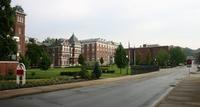
California University of Pennsylvania (CAL U), an institute of the Pennsylvania State System of Higher Education, offers various courses, certificates, and degrees in Homeland Security; a recent survey found that CAL U offers the nation’s best Internet-based degree programs; the acting dean of the college of liberal arts says: “the quality, education, experience, and student-centered attitude of our faculty, along with our connections with real world professional organizations makes us one of the top education institutes in our country”
-
-
University offers unmanned drone program to students
Indiana State University (ISU) has announced that it is offering an “unmanned systems” program to its students; the program is one of the few in the nation that trains students in the use of unmanned aerial vehicles (UAVS); ISU hopes to expand the program to include local and state agencies; ISU is already working with the local police department to conduct search and rescue exercises; other uses include civilian agricultural mapping
-
- All
- Regional
- Water
- Biometrics
- Borders/Immig
- Business
- Cybersecurity
- Detection
- Disasters
- Government
- Infrastructure
- International
- Public health
- Public Safety
- Communication interoperabillity
- Emergency services
- Emergency medical services
- Fire
- First response
- IEDs
- Law Enforcement
- Law Enforcement Technology
- Military technology
- Nonlethal weapons
- Nuclear weapons
- Personal protection equipment
- Police
- Notification /alert systems
- Situational awareness
- Weapons systems
- Sci-Tech
- Sector Reports
- Surveillance
- Transportation
Advertising & Marketing: advertise@newswirepubs.com
Editorial: editor@newswirepubs.com
General: info@newswirepubs.com
2010-2011 © News Wire Publications, LLC News Wire Publications, LLC
220 Old Country Road | Suite 200 | Mineola | New York | 11501
Permissions and Policies
Editorial: editor@newswirepubs.com
General: info@newswirepubs.com
2010-2011 © News Wire Publications, LLC News Wire Publications, LLC
220 Old Country Road | Suite 200 | Mineola | New York | 11501
Permissions and Policies
